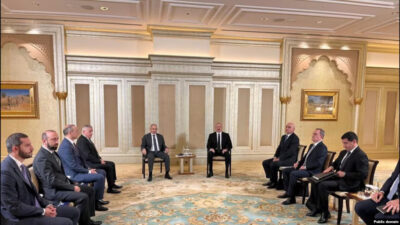By Melanya Badalyan
YEREVAN (Azg) – This year the annual Vahan Tekeyan Awards Ceremony of the Tekeyan Cultural Association (TCA) took place on April 26 at the Tekeyan Center, during a period of crisis and uncertainty in Yerevan. As Hravard Hakobyan, chair of the TCA art awards committee, said, the fact that it did indeed occur during this difficult period was unexpected. These awards, which have long been established in Armenia and the diaspora, are the most prestigious ones after the series of Armenian state awards, and are eagerly awaited in intellectual circles.
The ceremony began with a speech of welcome by Rouben Mirzakhanian, president of the TCA of Armenia. He declared that over the past twenty years following the independence of Armenia, TCA has awarded over $220,000 (American dollars) in order to encourage cultural life in Armenia. Deputy Prime Minister of the Republic of Armenia Vache Gabrielyan then spoke words of encouragement.
Traditionally, the first thing that takes place as part of the formal awards ceremony is the announcement of the avant-garde in literature. Edmond Azadian, the chairman of the literature committee, instead shared his concerns about the present crisis and announced that the Tekeyan Cultural Association would donate fifty thousand dollars to the families of wounded or deceased soldiers. He declared that it was necessary to continue to raise money for such purposes.
Then, going on to the literary sphere, he noted how few the works were compared to last year. Davit Hovhannes won the TCA Shake Ghazarian award for literature for his collection of poems titled Tagnapner [Crises]. Azadian said the poet has found a unique form and style to express through poetry some of the shadowy, crude or ugly aspects of life. He praised Hovhannes’s way of creating words.
Literary critic Yervand Ter-Khachatryan received an award for the preparation of three volumes on the poet Indra (Diran Chrakian). Azadian spoke at length about Ter-Khachatryan’s efforts over the years for the presentation and preservation of Western Armenian literary values. Their loss, Azadian declared, would be the loss of a world-level literature the heir of which is today’s Armenia. Ter-Khachatryan in turn spoke about the high quality of Indra’s work. He was one of the greatest writers in Armenian, he said.







